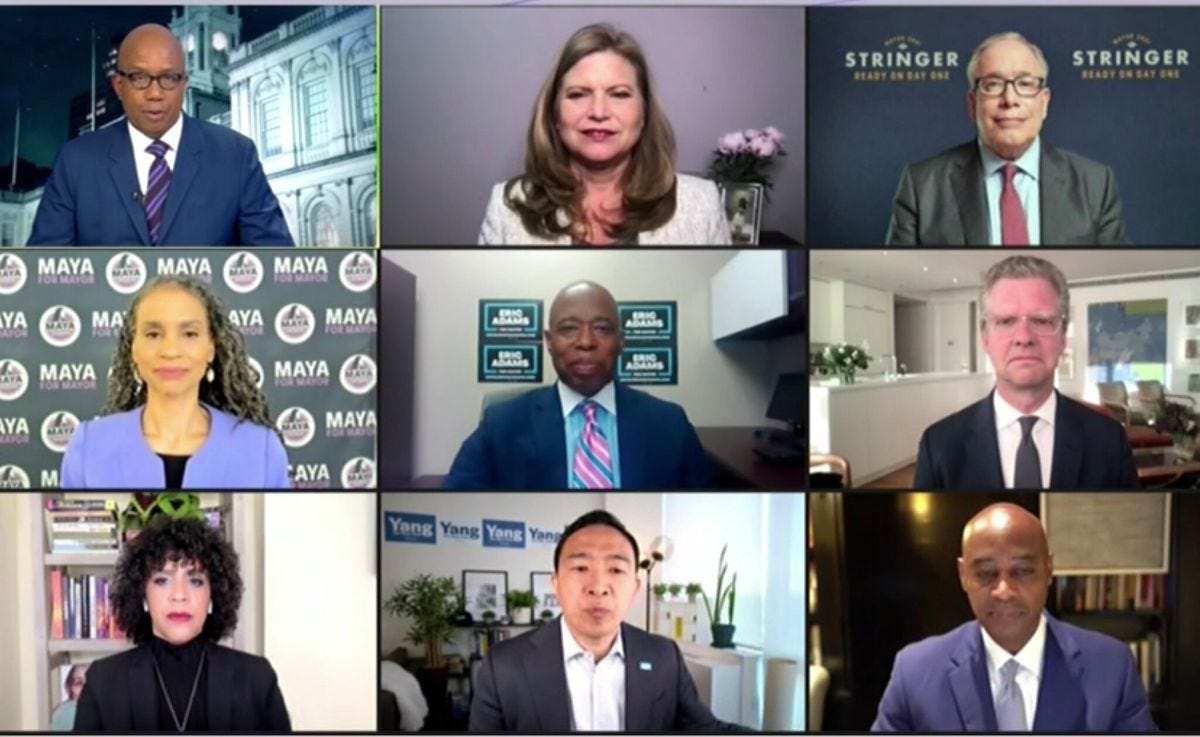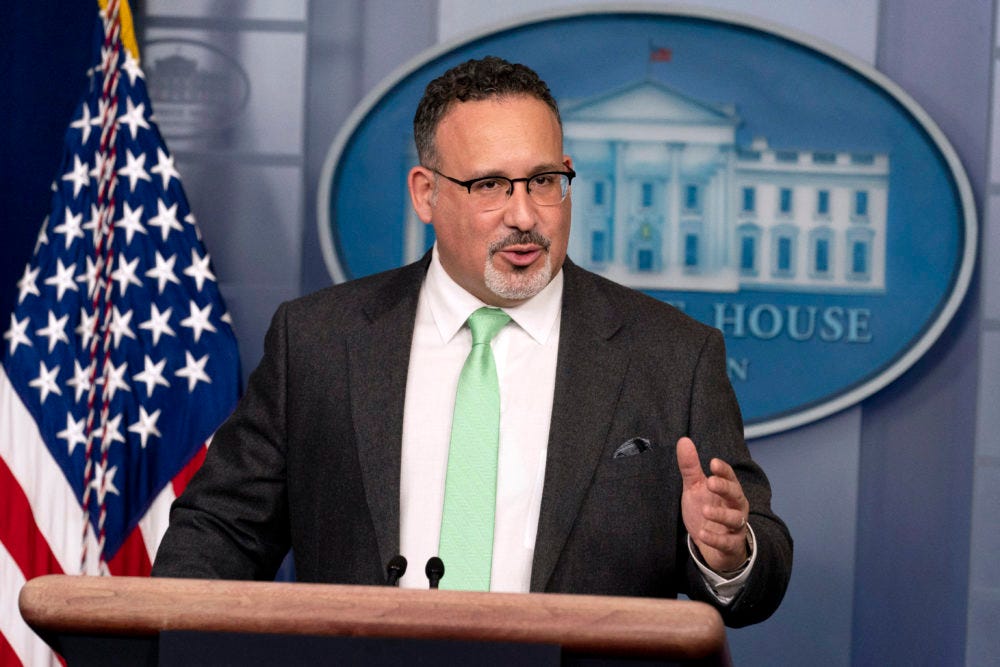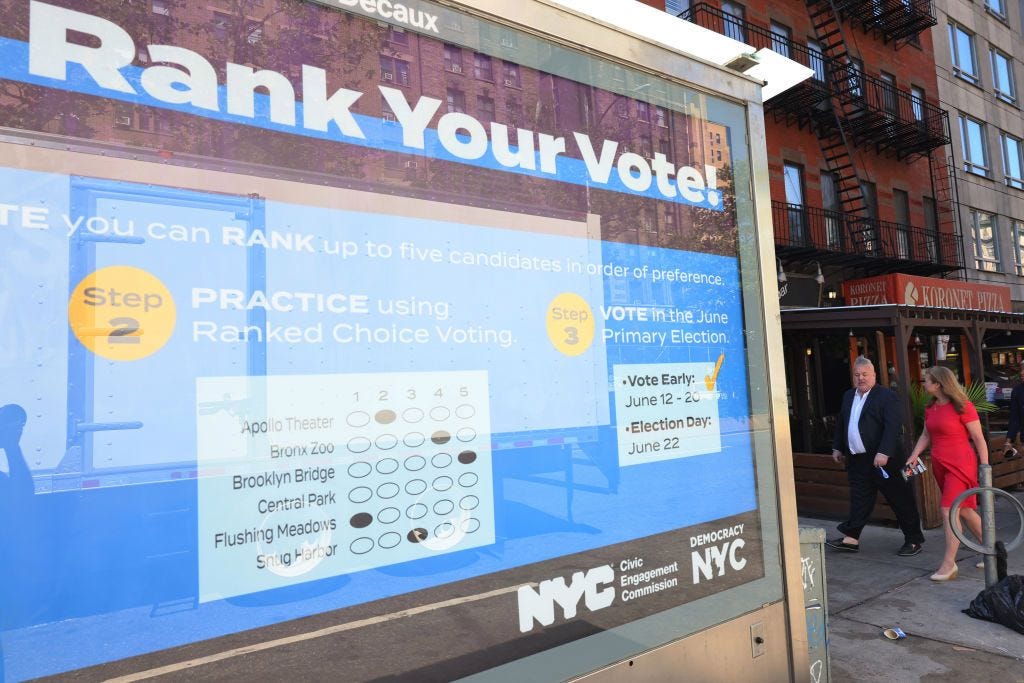Wake Up To Politics - June 22, 2021 (+)
Good morning! It’s Tuesday, June 22, 2021. Election Day 2022 is 504 days away. Election Day 2024 is 1,232 days away.
This morning’s top story was co-written by me and Mac Healey, a New York City high school student and Wake Up To Politics guest writer:
The New York City mayoral primaries are today. The general election to succeed two-term Mayor Bill de Blasio isn’t until November — but in deep-blue New York, all eyes are on the Democratic primary today, which will select the presumptive heir to City Hall.
New York has never seen such a diverse field of candidates. The field of Democratic contenders features several candidates of color, including Brooklyn Borough President Eric Adams, former presidential candidate Andrew Yang, former de Blasio aide Maya Wiley, businessman Ray Mcguire, and former nonprofit executive Dianne Morales.
Wiley, Morales, or former Sanitation Commissioner Kathryn Garcia would each also be the first woman to lead the nation’s most populous city. (Candidates in the Republican primary include entrepreneur Fernando Mateo and Curtis Silwa, founder of the “Guardian Angels” volunteer crime-prevention group.)
The Democratic field also ranges the ideological spectrum of the party. After successes by Rep. Alexandria Ocasio-Cortez (D-NY) and other local left-wing candidates in recent years, however, the progressive candidates have struggled to find a foothold in the race.
Morales and Comptroller Scott Stringer were both initially touted by progressives, only to flame out after facing allegations of employee abuse and sexual misconduct, respectively. That leaves Wiley as the most prominent progressive contender, while moderates such as Adams, Yang, and Garcia have captured most of the momentum in the race.
Amid the city’s crime rate, policing has emerged as a key issue dividing the primary field: Wiley, Morales, Stringer, and former HUD Secretary Shaun Donovan have all called for cuts to the police budget, while the three moderate frontrunners have criticized the “defund the police” slogan gaining cachet on the left.

The race will also be shaken up by a major change in New York City’s voting system. Approved with a ballot question in 2019, the city has moved to a ranked-choice voting system for many local primaries and special elections. Today’s primaries will mark the city’s first major foray into ranked-choice voting.
The system, which is also known as “instant runoff voting,” has previously been used in Maine and cities such as San Francisco, but the elections in New York City — home to 8 million people — will represent the largest-ever test of ranked-choice voting in the United States.
Here’s how it works: Voters can rank up to five candidates on their ballots in order of preference. All of their first-choice votes will be tabulated, and then two things can happen from there:
If a candidate has a majority of first-choice votes, then they are crowned the winner.
But if no candidate claims an outright majority, the attention shifts to the candidate with the least number of votes. That candidate is now out of the running, and the second-choice votes of anyone who ranked that candidate first are counted and added to each candidate’s total.
That process repeats itself until a candidate notches a majority, which can take several rounds of candidates being eliminated and having their votes re-allocated.
It can be confusing, but advocates say it can also improve the way we all vote. Ranked-choice voting allows voters to express a preference for their favorite candidate without worrying about electability, since their vote still counts even if their top choice is eliminated. This ensures a broader range of candidates can play a viable role in the race, without acting as “spoilers” who might take votes away from more likely contenders.
Ranked-choice voting backers also say the system ensures a candidate with broader appeal to most of the electorate wins the race, as opposed to the “first-past-the-post” system used in other U.S. races that allows candidates to win with only plurality support.
Some also hope that ranked-choice voting will bring some niceties to the political scene. The camaraderie between candidates is key in ranked-choice voting, as like-minded contenders often build coalitions and encourage their voters to rank an opponent second to ensure that someone of a certain ideology wins, even if it isn’t them.
Some of that has been present in the New York race — Yang has urged his voters to rank Garcia second, for example (although she notably decided not to reciprocate in a joint campaign appearance with him). But the system change has not prevented an acrimonious ending to the race: just last night, Adams (who leads in most polls) called Yang a “liar” and a “fraud” after suggesting that his alliance with Garcia amounted to “voter suppression.”
Critics, however, have accused ranked-choice voting of being too confusing for voters. Thousands of ballots are often invalidated in ranked-choice races because voters forget to rank the candidates or rank multiple candidates first. Additionally, large numbers of voters often only select one choice, as they would in a normal election, defeating the purpose of the ranked-choice system.
New York City launched a $15 million campaign to educate its citizens about ranked-choice voting, including a test run using pizza toppings.
Another drawback to ranked-choice voting is how long it will take for a winner to be known. A victor in the Democratic primary may not emerge for weeks, since the city has to count every ballot — including every absentee ballot, some of which may need to be “cured” — and then do so again, and again, until someone has a majority.
While the city board of elections will release the first-choice results from the mayoral primaries tonight, the final ranked-choice results are not slated to be certified until July 12.
The Rundown
What else you need to know to start your day.
The Senate will vote today on advancing the For the People Act, the sweeping Democratic elections reform bill. With unanimous Republican opposition, the measure is not expected to receive the 60 votes it would need to overcome a GOP filibuster and advance to a final floor vote.
Although it is a top priority for congressional Democrats, it is unclear if the bill will even receive all 50 Democratic votes: Sen. Joe Manchin (D-WV) previously announced his opposition, although he may allow the measure to advance today in hopes of having it replaced with his compromise proposal.
In its current form, the For the People Act — which passed the House in March — would require states to offer same-day and automatic voter registration, expand voting by mail and early voting, make Election Day a federal holiday, limit partisan gerrymandering, set new campaign finance rules, and create new ethics standards for federal officeholders.
Negotiations will continue over a bipartisan infrastructure package. The 21 senators — 11 Republicans and 10 Democrats — who have signed off on the $1.2 trillion framework will meet today in hopes of ironing out more key details, including how the package would be paid for. Meanwhile, Democrats are eyeing a $6 trillion spending plan to pass President Joe Biden’s other economic priorities through the one-party reconciliation process.
And one more thing: In the early days of the coronavirus pandemic, as the White House struggled with what to do about American citizens infected with the virus abroad, former President Donald Trump reportedly mused about sending them to Guantánamo Bay, according to a new book.

Policy Briefing: The week in education news
Every Tuesday, Wake Up To Politics contributor Kirsten Shaw Mettler breaks down the top headlines in education policy:
The Education Department announced that Title IX protects gay and transgender students. Two weeks before President Trump left office, his administration said that transgender students were not included in the education-based sex discrimination law, Title IX. On Wednesday, the Biden administration reversed this policy, citing a Supreme Court ruling as justification. Going forward, the Education Department will consider discrimination based on gender identity or sexual orientation as violations of Title IX.
A unanimous Supreme Court decision was issued in favor of student athlete compensation. On Monday, the court ruled that the NCAA cannot bar college athletes from receiving modest payments. The justices said that colleges must be allowed to “pay” their athletes through education-related benefits, like computers and financed study abroad opportunities. There was no final ruling on the issue of paid salaries for college athletes.
Critical race theory continues to be a hot topic in education. Last week, Rep. Glenn Grothman (R-WI) introduced legislation to ban the academic framework in D.C. schools. An additional 20 states have attempted to scrub critical race theory from their state curriculums, and as a result, 110 scholarly and educational organizations have signed a letter condemning the limitation of racism discussions in classrooms.

Gabe’s Picks
My reading recommendations for the day.
Still want more Manchin? I linked to two profiles of Sen. Joe Manchin (D-WV) in Monday’s newsletter, but this one from Evan Osnos in The New Yorker is worth reading as well. It opens with a great anecdote from aboard Manchin’s houseboat and delves deeper into his life and career in West Virginia and Washington, D.C., from there.
Something to watch. Democrats are “unilaterally disarming” in the redistricting wars, Ally Mutnick of Politico writes, as several states controlled by the party are turning redistricting over to independent commissions. Mutnick quotes several Democratic members of Congress who openly complain about the moves, which they say creates an imbalance with Republicans.
Poll of the day. According to a Monmouth poll released on Monday, 32% of Americans “continue to believe that Joe Biden’s victory in 2020 was due to voter fraud — a number that has not budged since the November election.” 14% of the American public say “they will never accept Biden as president.”
Another interesting takeaway from the poll: 80% of Americans support requiring voters to show photo ID before casting a ballot, cross-party support for an initiative that has been embraced by Republican politicians but condemned by Democrats.
An interesting take. Congress is frequently described as being mired in gridlock and obstruction. But Simon Bazelon and Matt Yglesias argue in the Slow Boring newsletter that lawmakers actually get a lot done — and on a bipartisan basis — but that most of it doesn’t get a lot of attention.
That’s by design, they write, asserting that the “Secret Congress” dynamic is crucial to allowing important pieces of legislation to quietly sail through. (Nothing is secret to Wake Up To Politics readers, of course, since nearly everything Congress does — including bills large and small — is chronicled in the “Daybook” section.)
A reminder to be grateful. Here’s a paragraph that made me smile, from a guest essay by Ali Drucker in the New York Times:
“Suddenly, everything feels like a blessing. Hugging casual acquaintances, grocery shopping without fear and planning a trip all feel so decadent that I often wonder if I’m worthy of any of it. Forget water into wine; in less than a year, scientists developed a lifesaving medical marvel that sent death rates plummeting. We’re living through a modern miracle.”
Correcting the record
Monday’s newsletter incorrectly stated which Pennsylvania city was being visited by Vice President Kamala Harris. Harris traveled to Pittsburgh.
Daybook
What’s happening in Washington today. (All times Eastern.)
Executive Branch
→ President Joe Biden and Vice President Kamala Harris will receive their daily intelligence briefing at 10:15 a.m. and have lunch together at 12:30 p.m.
At 1:45 p.m., Biden will meet with FEMA Administrator Deanne Criswell and Homeland Security Advisor Elizabeth Sherwood-Randall to discuss “FEMA’s ongoing efforts to respond to and prepare for extreme weather events” and the agency’s “support for communities in need.”
→ White House Press Secretary Jen Psaki will hold her daily press briefing at 1 p.m.
→ U.S. public health officials will hold their weekly press briefing on the COVID-19 response at 12:30 p.m. Participants will include Dr. Anthony Fauci, Surgeon General Vivek Murthy, CDC Director Rochelle Walensky, and White House COVID-19 Response Coordinator Jeff Zients.
Legislative Branch
→ The Senate will convene at 10 a.m. and resume consideration of Christopher Fonzone’s nomination to be General Counsel of the Office of the Director of National Intelligence. At about 11:45 a.m., the chamber will hold a confirmation vote on Fonzone, followed by a cloture vote to advance Kiran Ahuja’s nomination to be Director of the Office of Personnel Management.
The chamber will then recess until 2:15 p.m. to allow for weekly caucus meetings. At about 2:30 p.m., the Senate will hold a confirmation vote on Ahuja. The chamber will then debate S. 2093, the For the People Act, before holding a cloture vote at around 5:30 p.m. The bill would need 60 votes to advance.
→ The House will convene at 12 p.m. The chamber will vote under “suspension of the rules” on 18 pieces of legislation:
H.R. 1374, the Enhancing State Energy Security Planning and Emergency Preparedness Act
H.R. 482, the Newborn Screening Saves Lives Reauthorization Act
H.R. 3752, the Pandemic Effects on Home Safety and Tourism Act
H.R. 3723, the Consumer Safety Technology Act
H.R. 3182, the Safe Sleep for Babies Act of
H.R. 1314, the STURDY Act
H.R. 3841, the Tribal Health Data Improvement Act
H.R. 983, the Preventing Crimes Against Veterans Act
H.R. 2694, the Criminal Judicial Administration Act
H.R. 2922, the Elder Abuse Protection Act
H.R. 961, the Justice for Juveniles Act
H.R. 3239, to make improvements in the enactment of title 41, United States Code, into a positive law title and to improve the Code
H.R. 3241, to make improvements in the enactment of title 54, United States Code, into a positive law title and to improve the Code
H.R. 704, the ARTS Act
H.R. 2571, the AMIGOS Act
S. 1340, a bill to amend title 28, United States Code, to redefine the eastern and middle judicial districts of North Carolina
H.R. 2679, the Foundation of the Federal Bar Association Charter Amendments Act
S. 409, to provide for the availability of amounts for customer education initiatives and non-awards expenses of the Commodity Futures Trading Commission Whistleblower Program→ The Senate Homeland Security and Governmental Affairs Committee will hold a hearing at 10 a.m. on the possibility of adding Washington, D.C. as the 51st state in the union. Witnesses will include former Sen. Joe Lieberman (D-CT) and D.C. Mayor Muriel Bowser.
→ The Senate Judiciary Committee will hold a hearing at 10 a.m. on federal sentencing guidelines for crack and powder cocaine. Witnesses will include Gov. Asa Hutchinson (R-AR) and Regina LaBelle, the acting director of the White House Office of National Drug Control Policy.
→ The House Select Subcommittee on the Coronavirus Crisis will hold a hearing at 2 p.m. on the Federal Reserve’s response to the pandemic. Federal Reserve Chairman Jerome Powell will testify.
Judicial Branch
→ The Supreme Court is not scheduled to release any orders or opinions.
Thanks for waking up to politics! If you enjoy reading this newsletter, I’d be so grateful if you’d consider donating to help support me and my work. If you want to show off your support for Wake Up To Politics, you can also buy some merchandise.
Also: don’t forget to tell your friends and family to sign up for the newsletter using your unique referral link. And if you have any questions or comments, feel free to email me at any time.





